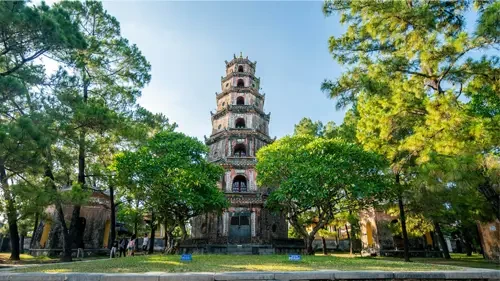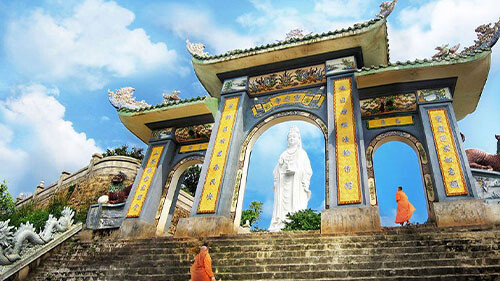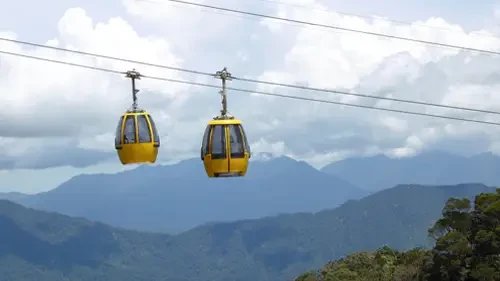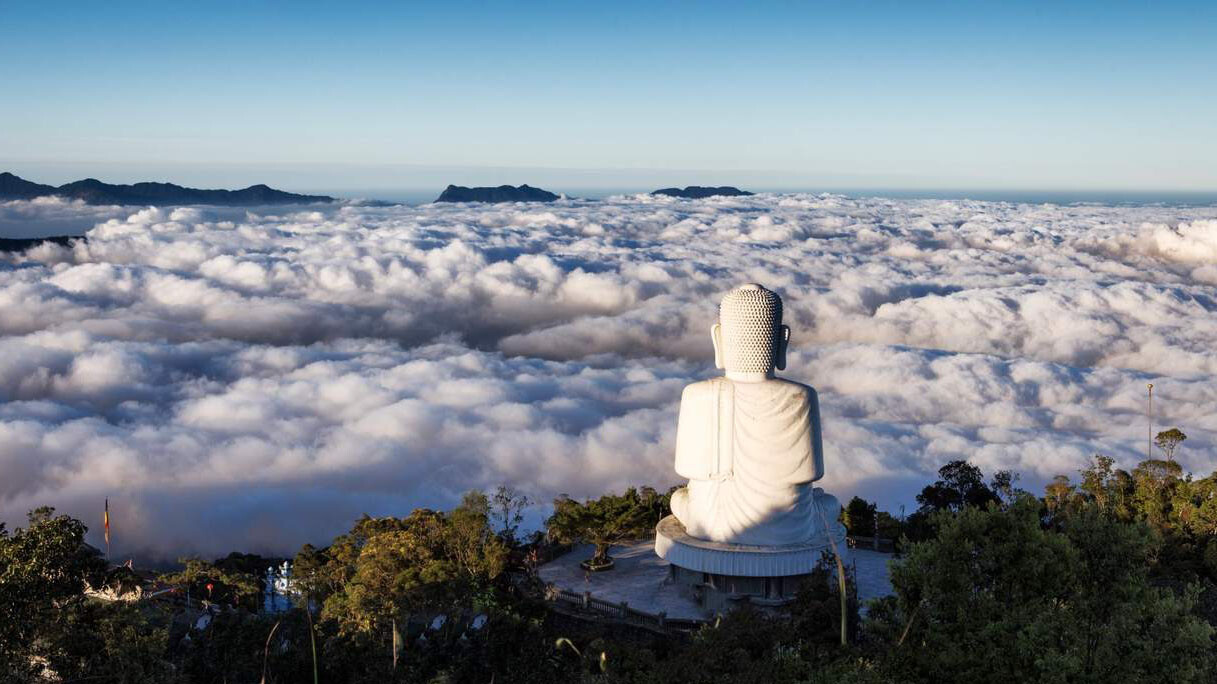Da Nang Travel Guide: Where to go and what to do

Updated on 05 Mar 2024
Located in the central coast of Vietnam, Danang is the third largest city in the country, right behind Ho Chi Minh city and Hanoi. But different from the top crownded cities, Danang is the perfect blend of sea and mountains, history and modernity. Well-known as the most liveable city in Vietnam, Danang offers tourists a variety of experience with many different and unique places, delicious food as well as its friendly people.
To help you have an easier time planning and preparing for your Danang trip, we would like to give you several suggested locations as well as what to do in these places.
Half-day trips
Let’s start with half-day trips! A half-day trip may sound short for some but if you don’t have much time, it will be the perfect choice.
Marble mountains
When travelling to Danang, it would be not complete without a visit to Marble mountains. As the name partly suggests, the Marble Mountains are a cluster of five hills made from limestone and marble. But this group of mountains are actually called “Ngu Hanh Son” in Vietnamese, which is literally translated in to “The mountain of Wu Xing”. Therefore, it is believed that the mountains reflect the belief of balance between five elements in traditional oriental culture.

Ngu Hanh Son
Marble mountains consist of various peaks, caves, tunnels and temples to be discovered. Tourists are free for explore natural landscapes such as Van Nguyet Grotto, Lantern Cave and Am Phu Cave and enjoy spectacular views across Non Nuoc, also known as My Khe Beach. Beside the beauty of nature, also don’t forget to have a look at beautiful religious architectures. Famous as a pilgrimage site for Buddhists in the region, the Marble mountains attract thousands of followers to participate in ancient Mahayana Buddhist rituals in sacred temples and pagodas during Buddhist holidays every year.
Ba Na hills
.jpg)
Ba Na Hills
If you seek for entertainment, Ba Na hills may be the right choice. Lying on a very high mountain to the southeast of Danang, Ba Na hills is a complex of amusement parks, incredible views, cable cars, and European villages.
Get into the world’s longest non-stop cable car and you would be like wandering to another world. Contrast to the unbearable heat of Danang, Ba Na is much cooler, fresher with forests and mist. The Fantasy Park area is also highly recommended with a variety of games which are suitable not only for kids but also for adults.
Also don’t forget to explore the Golden Bridge, famous for its spectacular Buddha’s hands. The bridge was constructed in such a high and beautiful sky gate reminding us of the Nevara according to Buddhist belief. It’s also famous as a check-in spot for youngsters due to its exotic and photogenic beauty.
Son Tra Peninsula

Son Tra Peninsula
Only 16 km separated from the city center, Son Tra peninsula is also highly recommended for tourists. Although bus and taxi are available in this area, a motorbike trip would be perfect as you are allowed to experience the magnificence of the nature as you pass by.
The legacy of war is still visible. During the Vietnam war, Son Tra served as an airport for the South Vietnam’s army. Therefore, you can still spot military roads, airport lines and sometimes broken parts of machines. But the best part is still the nature. The peninsula comprises of many lovely beaches and high mountains. Swimming and driving in the crystal-clear sea are also available as long as you guarantee your own safety.
Son Tra is also home to Linh Ung Pagoda, the holiest buddhist pagoda in the city.Linh Ung was built according to Vietnamese traditional architecture but with some blends of modern elements. The highlight of the pagoda is the 67 meter Quan Am Bodhisattva statue- a deity of Buddhism, which holds the record as the biggest statue in Vietnam.
Full day trips
If you have more time, a visit to these following destinations is highly recommended.
Hai Van pass
Lying between the border of Thua Thien-Hue and Danang, Hai Van pass has been recorded as one of Vietnam’s wonders for hundreds of years. Although it can be quite far from Danang, the view is definitely worth the effort.
The best time to visit Hai Van is in the early morning. So get up a little bit early because you wouldn’t want to miss the sunrise-The time when the view is just breathtaking.
Although the area is accessible by motorbike, you would still have to walk to the top. The path to the top is rough and winding, therefore it is recommended to wear shoes. You also can rest at several buildings before reaching the top. One of them is Hai Van Gate, a relic dated back from Nguyen dynasty, built in order to guard the city of Hue in case of invasion.

Hai Van pass
Once you get to the top, everything is just speechless. It’s not only the chance to enjoy spectacular panoramic views to below beaches and cities but also the moment to appreciate nature for the gift it entitled to humankind.
Hoi An
Hoi An is a small town 30 km to the south of Danang. Looking at its humble present, you may easily underestimate it. But believe it or not, Hoi An used to be one of the key points in the maritime trade across Asia in the 16th and 17th century.

Hoi An
Even though the glorious past is over, Hoi An’s charm and beauty are perhaps timeless. The town consists of ranges of yellowish houses with brown roof. The colors may seem simple and unsophisticated, but they really reflects the uniqueness of Vietnamese culture and spirit. You may also spot Chinese halls built by Chinese migrants and the famous Japanese bridge appearing on Vietnam’s two thousand VND note. These buildings are proofs for the bustling past of Hoi An when the town served as an international trading center where goods were exchanged, sold, bought.
Hoi An in daytime is already beautiful, but when night comes it becomes even more graceful with thousands of colorful traditional lanterns hung on the streets. You can also find floating lanterns sold everywhere in the town. Once put on the surface of the river, those tiny floating lanterns would flow according to the course of the river, making it resemble a river of stars.
Hoi An is also famous for its food. Very famous ones are Cao Lau, Banh Mi and Banh Bot Loc. Although these dishes now can be found throughout Vietnam, it is said that nowhere can beat the taste of Hoi An food.
Cu Lao Cham
Cu Lao Cham is a chain of Islands consisting of eight small islands off the coast of Hoi An. It was listed as one of UNESCO World Biosphere Reserves thanks to its diversity in fauna and flora. For travellers looking to enjoy a day of scuba diving and snorkelling, Cu Lao Cham Marine Park is the perfect choice while fishing villages and pristine beaches that are great for sunbathing and water sports can be found in Hon Lao Island. If you are looking for where to stay, homestays (mostly located along Bai Chong Beach) are the most popular accommodation choice. In case you want something more adventurous, there are also plenty of restaurants and dive centres that offer tent rentals at reasonable price.

Cu Lao Cham
Cu Lao Cham is popular to tourists with a variety of activities involving the beach such as swimming, sunbathing, and enjoying water sports. There are many beautiful beaches in the islands but most can be found in Hon Lao. These include Bai Cong Beach, Bai Ong Beach, Bai Bac Beach, and Bai Xep. Located 2 km south of the main jetty, Bai Cong mainly caters to tourists and here you can find a spacious beachfront bedecked with sunbeds and parasols. There’s also plenty of shops that offer equipment rentals for kayaking, jet skiing, and snorkelling. Diving at Cu Lao Cham Marine Park is suitable in June and August. Home to a thriving coral reef system and marine life, this marine park is a popular spot amongst diving enthusiasts. You can either join a day trip that’s organised by tour companies in Hoi An or engage the services of a local diving centre on Hon Lao Island.
My Son Sanctuary
The central part of Vietnam used to known as Champa, a kingdom heavily influenced by Indian culture, as contrast to the Vietnamese kingdom to the North with more influence from China. They had a complex life, reflecting in religious practices with the construction of My Son sanctuary.

My Son Sanctuary
My Son is 40 km to the southwest of Danang, in the neighboring province of Quang Nam. The sanctuary is divided into several groups of towers, constructed from 4th to 13th century. These towers showcased the unbelievably skillful building techniques of ancient Champa architects as there is no mortar needed to build these brick architectures. Most of these towers were constructed as a sign of devotion and submission to Hindu gods from Champa people. Some also argued that the purpose of the sanctuary is to wish for a bumper harvest to farmers and a good catches to fishermen- Two pillars of Champa economy in the past. Unfortunately, most of the towers are now in bad condition due to war and lack of preservation. Many were also fell into victim to bombing in the Vietnam war, leaving only ruins behind.
A trip to My Son would be not only a journey to history but also a chance to enjoy the beauty of ancient architectures and arts.
Weekend trips
If you have more time, consider the following trips. It can be a little bit quite far from Danang, so you will need several hours to move. However, it will be definitely worth it.
Ly Son island
Also known as Hon Re, the island lies nearly 30 km offshore to the coast of Quang Ngai, 122 km from Danang. Ly Son is well-known nationwide for its natural beauty and isolation.
To get to Ly Son from Danang, you can use either train or bus. Motorbike is also possible, but it can take quite long. Now that you get to Quang Ngai, take a fare from Sa Ky port and Ly Son would be there for you. But avoid winter months as the tides can be really high and the winds can be very strong.

Ly Son island
Ly Son is mysterious right from its formation. The island was formed 25-30 million years ago due to volcanic eruption from the sea floor, creating the island with 5 different volcanoes scattered throughout the small island. Travelling to Ly Son, you would be amazed by its breathtaking beauty. Even though humans have been present on the island for 3 thousand years, the landscapes are still much very wild and unspoilt. There are also various beaches with pristine white sand, which are very ideal for beach sports, picnic or sunbathing. Swimming and diving are also things you shouldn’t miss as the waters around Ly Son is crystal-clear with huge diversity in fish and coral reef.
Hue citadel
Holding the status as the capital of Vietnam for 142 years, Hue is well-known for its royal architectures and food. The city is located on the banks of the romantic Perfume river, almost 92 km from Danang.
The city is full of monuments, palaces and tombs, reminding us of its glorious past. Hue citadel was constructed in 1802 under the reign of Gia Long with the most skillful architects and builders as well as building materials from all over the country. The complex was acknowledged as one of the world heritage sites by UNESCO in 1993 due to its value in both architecture and history. Although many buildings were destroyed during the war, much of it still stays intact and other are under reconstruction.

Hue citadel
Also, don’t miss Hue food! Perhaps as the city was the capital for such a long time, the city became a culinary center attracting the best cooks in the country to prepare lavish dishes for the royal family.Hue food is diverse, sophisticated and nutritious in nature. Most of the food use a wide range of ingredients as well as countless types of spices, contributing to their distinct flavour. Popular ones are Bun Bo Hue, Banh Beo, Com Hen and Che Khuc Bach.
Lang Co beach
Lang Co is the name of beach and town located 30 south of Hue city and 70 km north of Danang. The town is a chain in the heritage route of central Vietnam which passes through 3 main destinations: Hue citadel, Hoi An and My Son sanctuary.

Lang Co beach
From a long time ago, Lang Co served as the summer resort for Nguyen royal family. Nowadays, its beauty still shows no change and was even acknowledged as one of the world most beautiful beach in 2009.
Lang Co is most stunning from April to August when summer is in its peak and the sea is in its bluest time. The beach is also irresistibly beautiful with pristine white sand, suitable for beach sports, sunbathing and picnic.
If you travel on a budget, staying in guesthouses or homestays may be a good idea. But if you have more many, a night in one of newly built resorts in Lang Co would also be perfect. The resorts are usually situated on the best parts of the beach, thus offer incredible views. There are also 5 star restaurants serving the best food from the best catches from the sea in the morning.
Bach Ma National Park
Situated 40 Km south of Hue city, Bach Ma National Park is one among 30 national parks in Vietnam. Covering a total area of 37.500 ha, the national park is rich and diverse in its ecosystem.
The best time to visit is from December to April when the weather is dry and you don’t have to walk in slimy dirt with leeches crawling around you. Bach Ma is suitable for trekking or hiking trips. You can be around the nature while walking past dreamy jungles full of birds and butterflies. The atmosphere under thick tree canopy is cool contrast to that outside, which even makes your trip more interesting.

Bach Ma National Park
But beside the nature, Bach Ma also has many other amazing spots for tourists such as Hai Vong Dai and Do Quyen waterfall. Hai Vong Dai is like a lighthouse of Bach Ma. But instead of the sea, you may observe the panoramic view of the jungles. It is also a very popular check-in spot for youngsters. Walking 2 km past Hai Vong Dang, you reach Do Quyen waterfall. Do Quyen is a natural waterfall in the center of Bach Ma. The name of the waterfall means Rhododendron flower in English, which originated from the fact that the surrounding area is home to many Rhododendron trees.
As the region is almost jungles, there are hardly any hotel. Therefore, you may choose between camps or homestays. Also, remember to bring some food and drink because it may not be easy to find food when you are hungry.
Phong Nha- Ke Bang National Park
This place is the farthest from Danang that we recommend to you. As the distance between Phong Nha- Ke Bang National Park and Danang is almost 300 km, it may take 6 hours of non-stop driving. Therefore, the best transport is perhaps car. You may use motorbike but it will take a lot of time.

Phong Nha-Ke Bang National Park
Covering a total area of 220,000 ha, Phong Nha- Ke Bang National Park is often compared to a gigantic geological museum. The park is most famous for its caves. Up to now, more than 300 caves have been discovered including Phong Nha cave, Paradise cave and Son Doong cave - The biggest in the world. There are also systems of underground rivers flowing across the caves, creating one of the most complicated networks of underground water in the world.
If you are planning a trip to Phong Nha- Ke Bang National Park, don’t forget to spend some time exploring caves full of stalactites and stalagmites. Some like Phong Nha are open for tourists, but with more dangerous and vulnerable one like Son Doong, only a limited number of tourists are allowed every year. With the reflection of light, beautiful stalactites and stalagmites appear magically like some mythical creatures you find in your wildest dream. It should be something you shouldn’t miss.
Apart from systems of caves and rivers, Phong Nha- Ke Bang National Park is also famous for its diversity in fauna and flora with countless plant and animal species that can only be found there. The region is home to the Saola, the rarest mammal on earth. Therefore, spend your time exploring the park’s diversity and learn more about nature would be really worth a try.
Useful travel blogs
About A21 Tours
As a pioneering e-commerce travel agency in Vietnam, now expanding into Laos and Cambodia, A21 Tours proudly offers over 5,000 unique travel products across Vietnam, Laos and Indochina.
Explore A21 Tours


